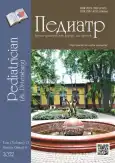Влияние пептидных биорегуляторов на резистентность крыс к холодо-стрессорному фактору
- Авторы: Ганапольский В.П.1, Агафонов П.В.1, Матыцин В.О.1,2
-
Учреждения:
- Военно-медицинская академия им. С.М. Кирова
- Первый Санкт-Петербургский государственный медицинский университет им. акад. И.П. Павлова
- Выпуск: Том 13, № 6 (2022)
- Страницы: 85-96
- Раздел: Обзоры
- URL: https://journals.eco-vector.com/pediatr/article/view/277318
- DOI: https://doi.org/10.17816/PED13685-96
- ID: 277318
Цитировать
Аннотация
Актуальность. Биологически активные регуляторные пептиды — новый класс препаратов, оказывающих избирательное действие на мишени, при этом не обладающих существенными побочными эффектами.
Цель — изучение потенциального влияния пептидных препаратов Кортексин® и Семакс® на резистентность организма крыс к холодо-стрессорному фактору на модели холодо-стрессорной дезадаптации.
Материалы и методы. Белым беспородным крысам-самцам вводили внутрибрюшинно дважды в сутки ежедневно плацебо (n = 30), Кортексин® в дозе 5 мг/кг (n = 30) либо Семакс® в дозе 0,3 мг/кг (n = 30). Через 3 сут после начала инъекционного курса моделировали холодо-стрессорное воздействие в условиях климатической камеры Feutron (Германия) путем охлаждения воздуха до 5 °С при относительной влажности 75–80 %. Стрессорный фактор создавали, используя специфический световой режим (круглосуточный свет), звуковую невротизацию (непрерывная громкая рок-музыка), а также ограниченный рацион питания (15 ккал/сут). Изучали динамику ректальной температуры, показателей физической работоспособности в тесте с плаванием, поведенческих реакций в тесте «открытое поле», количества лейкоцитов, нейтрофилов и лимфоцитов, сывороточных уровней кортизола и инсулина, белков теплового шока HSP-70 и гипоксия-индуцибельного фактора HIF-1α.
Результаты. Применение регуляторных пептидов статистически значимо увеличивало продолжительность периода плато ректальной температуры в пределах 35 °С (умеренная гипотермия): у животных группы Кортексина® с 10 до 12 сут, а у животных группы Семакса® — с 10 до 14 сут. Кортексин® показал умеренные иммуномодулирующие свойства, а Семакс® обладал более выраженным иммуномодулирующим эффектом. Оба препарата показывали стресс-протективный эффект. Применение регуляторных пептидов позволяло замедлять снижение общей двигательной активности и поисково-исследовательской активности крыс, развивающееся под влиянием моделируемого холодо-стрессорного воздействия. Отмечен более медленный темп снижения времени предельного плавания крыс под действием регуляторных пептидов.
Заключение. Подтвержден метеоадаптогенный, стресс-протективный и ноотропный эффект регуляторных пептидов Кортексина® и Семакса® у крыс на модели холодо-стрессорной дезадаптации.
Полный текст
Об авторах
Вячеслав Павлович Ганапольский
Военно-медицинская академия им. С.М. Кирова
Email: ganvp@mail.ru
д-р мед. наук, начальник научно-исследовательского отдела обитаемости Научно-исследовательского центра
Россия, Санкт-ПетербургПавел Владимирович Агафонов
Военно-медицинская академия им. С.М. Кирова
Автор, ответственный за переписку.
Email: agafonov23@yandex.ru
канд. мед. наук, старший преподаватель кафедры военно-полевой терапии
Россия, Санкт-ПетербургВячеслав Олегович Матыцин
Военно-медицинская академия им. С.М. Кирова; Первый Санкт-Петербургский государственный медицинский университет им. акад. И.П. Павлова
Email: matitsin@list.ru
канд. мед. наук, старший научный сотрудник научно-исследовательского отдела обитаемости Научно-исследовательского центра; доцент кафедры кафедры нормальной физиологии
Россия, Санкт-Петербург; Санкт-ПетербургСписок литературы
- Ашмарин И.П., Ещенко Н.Д., Каразеева Е.П. Нейрохимия в таблицах и схемах. Москва: Экзамен, 2007. 143 с.
- Ганапольский В.П., Агафонов П.В., Матыцин В.О. Моделирование холодо-стрессовой дезадаптации у крыс с целью разработки методов ее фармакологической коррекции // Российские биомедицинские исследования. 2022. Т. 7, № 1. С. 3–15. doi: 10.56871/2489.2022.64.64.001
- Каркищенко Н.Н., Каркищенко В.Н., Шустов Е.Б., и др. Биомедицинское (доклиническое) изучение лекарственных средств, влияющих на физическую работоспособность: Методические рекомендации. Москва: ФМБА России, 2017. 134 с.
- Каркищенко Н.Н., Уйба В.В., Каркищенко В.Н., Шустов Е.Б. Очерки спортивной фармакологии. Том 1. Векторы экстраполяции / под ред. Н.Н. Каркищенко, В.В. Уйба. Санкт Петербург: Айсинг, 2013. 288 с.
- Ким А.Е., Шустов Е.Б., Лемещенко А.В., Цыган В.Н. Патофизиологические основы формирования дезадаптации в условиях высокогорья и полярных зон // Вестник Российской Военно-медицинской академии, 2021, Т. 23, № 3. С. 215–222. doi: 10.17816/brmma71182
- Новиков В.С., Сороко С.И., Шустов Е.Б. Дезадаптационные состояния человека при экстремальных воздействиях и их коррекция. Санкт-Петербург: Политехника-принт, 2018. 548 с.
- Основы государственной политики Российской Федерации в Арктике на период до 2020 года и дальнейшую перспективу // Российская газета. Столичный выпуск. 27 марта, 2009. Т. 4877, № 42.
- Фисун А.Я., Халимов Ю.Ш., Агафонов П.В., и др. Особенности организации терапевтической помощи военнослужащим в Арктическом регионе // Военно-медицинский журнал. 2019. Т. 341, № 3. С. 73–75.
- Черников О.Г., Кульнев С.В., Куприянов С.А., и др. Особенности организации медицинского обеспечения группировки войск (сил) в Арктической зоне // Военно-медицинский журнал. 2020. Т. 341, № 4. С. 4–12.
- Шустов Е.Б., Гасанов М.Т., Капанадзе Г.Д., и др. Пептидная биорегуляция резистентности к экстремальным воздействиям // Биомедицина. 2018. № 2, С. 4–14.
- Шустов Е.Б., Капанадзе Г.Д., Фокин Ю.В., Матвеенко Е.Л. Методические особенности биомедицинских исследований влияния фармакологических средств на устойчивость организма к острой общей гипотермии // Биомедицина, 2017. № 3. С. 4–15.
- Даренская Н.Г., Ушаков И.Б., Иванов И.В., и др. Экстраполяция экспериментальных данных на человека: принципы, подходы, обоснование методов и их использование в физиологии и радиобиологии (Руководство). Москва; Воронеж: Истоки, 2004. 232 с.
Дополнительные файлы














